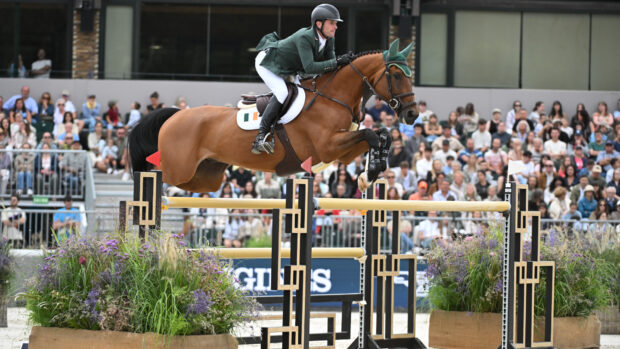THE FEI is to conduct a “thorough debrief” of the new format at the Tokyo Games and see what can be improved – but the changes were necessary to keep equestrian sport in the Olympics.
The three-man team format was a major talking point in Tokyo; H&H had reported extensively on concerns over the loss of the drop score and its implications. Showjumpers described it as “carnage” and “unfair on the rider who makes a mistake”.
Shane Sweetnam, whose ride Alejandro fell in the team competition to rule Ireland out of contention, agreed.
“Obviously with this new format everything counts, so it’s very hard for the team,” he said after his round. “We are out now, and that’s the negativity of having just a three-man team, that there’s no drop score. These things happen as you’ve seen – a couple of other teams are falling out of bed as well. It’s hard to follow it really and see if it can be the future of our sport.”
British Equestrian team leader Dickie Waygood told H&H that without a drop score, it was “slightly Monte Carlo or bust”.
“You lose the option of team tactics; in the old format you could maybe take some risks with one rider,” he said. “There was also a massive advantage in being drawn near the end; the last rider out of the start box would have been able to see all the number one and two riders and some of the threes – and there were some riders just getting their horses home to keep the team in.”
Dickie said this latter point was also seen in the showjumping, and “it puts a lot of pressure on riders”.
The reason for changing the format was to increase the number of participating nations, staying within the same quota of athletes, in line with International Olympic Committee (IOC) recommendations.
But Dickie questioned whether, as had been mooted before the Games, some of those combinations allowed in by the change should have been at the Olympics.
“Some of it wasn’t pleasing to the eye,” he said. “Some just weren’t really ready to be there.
“What we want [at the Olympics] is to see the best teams going head to head. If you lose someone through something very simple, like a lost shoe, or a broken frangible pin, and suddenly they’re out – we were very strong statistically going into the Games but it could have been a much closer competition.
“We know eventing is a sport of 1,000 variations, and this has made it 10,000.”
In dressage, another change was that in Tokyo, the grand prix special was the sole decider of the team medals. Under the old format, when the grand prix also contributed, Britain would have won silver rather than bronze – but the change brings dressage in line with many other sports, in which medals are decided on one performance.
As Dickie pointed out, dressage has fewer variations and less risk than the jumping disciplines, but “the same things could still happen”.
He added: “If we’re absolutely stuck with these numbers, which I know we are, then one option could be three to a team with a drop score; maybe that way we could navigate through it a bit better.”
British Showjumping chief executive Iain Graham pointed out that one advantage of the three-rider format was, as planned, that the sports were easier to follow.
“This is our one opportunity, every four years, to get to a global audience who aren’t necessarily equestrian,” he told H&H. “I’m sure many H&H readers have watched sports they wouldn’t normally see. And under this format, anyone could start watching, at any time, and know what was going on.
“When we were trying to qualify for Tokyo, at the 2019 Europeans, there were three of us trying to work out what our last rider needed to do; if we in the sport can’t follow it, without pens and paper, there’s no hope for anyone coming in and switching the TV on.”
Mr Graham said running the individual before the team showjumping also helped with clarity, as previously those only competing as individuals would have to jump in the team competition, although their scores did not count to a team total.
The new format also allowed riders to jump in just the individual competition and be swapped out again for the team.
“I think there are positives, in showcasing the sport to more people, and I think it did make for a more exciting competition,” Mr Graham said.
“Everyone started again on 0 faults for the second day of each competition, which is how it works in other sports; if you finished a second behind Usain Bolt in qualifying, you wouldn’t start a second behind him in the final – and in a 4x100m relay, you can’t drop the slowest time, but that’s what we’ve had the luxury of before. I accept we have two athletes on the field and there are decisions to be made on horse welfare, but the rider has to make those decisions, even if it means the team will be out.”
Mr Graham said the FEI and national federations will take all feedback on board, and look at what might need to be changed before Paris 2024, but he added that the FEI had had to bring in changes, having been told as much by the IOC.
An FEI spokesman told H&H: “The Tokyo 2020 Olympic Games were very successful, with great champions in all three disciplines. As already agreed a long time ago, we will do a thorough debrief to evaluate the formats and see what can be improved.”
You might also be interested in:

New three-rider format causes ‘carnage’ in Olympic showjumping, say riders

Three riders for Olympic teams confirmed
The drop score will be discarded and changes brought in to each discipline, voted in at the FEI general assembly

FEI and riders in deadlock over three-rider Olympic team plans
The FEI and riders have been debating planned changes to the Olympic format, but little progress has been made

Nick Skelton on Tokyo 2020: ‘The new showjumping format was a disaster’

Subscribe to Horse & Hound magazine today – and enjoy unlimited website access all year round

William Funnell reflects on Tokyo 2020: ‘Exciting sport and easier to understand’
Horse & Hound magazine, out every Thursday, is packed with all the latest news and reports, as well as interviews, specials, nostalgia, vet and training advice. Find how you can enjoy the magazine delivered to your door every week, plus options to upgrade to access our H&H Plus online service which brings you breaking news as it happens as well as other benefits.




